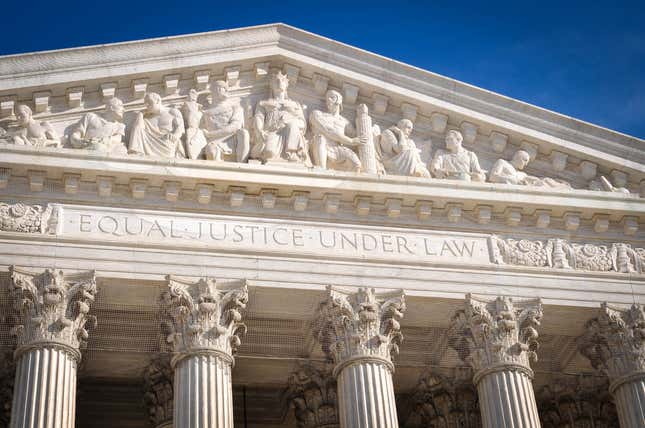
It’s no secret that Republicans are inimical to people with melanin having equal, fair access to the ballot box. And today, the Supreme Court—which has a Republican majority—heard arguments in two cases that could demolish what’s left of the Voting Rights Act, a critical bulwark against racial discrimination in voting.
Of course, the landmark civil rights law was already crucially undercut by the court’s decision in 2013’s Shelby County v. Holder, when Chief Justice John Roberts delivered a majority opinion that effectively invalidated Section 5 of the Act, a provision requiring that jurisdictions with a history of discriminatory voting rules get clearance before putting in place new voting requirements.
At the time, Justice Roberts wrote that “Our country has changed,” in the 50 years since the Voting Rights Act was passed (which is highly debatable). He also pointed to Section 2 of the Act as maintaining the ban against racial discrimination in voting.
But Section 2 could be the next key provision to be affected, as the Court heard arguments in Brnovich v. Democratic National Committee and Arizona Republican Party v. Democratic National Committee, a consolidated case involving voting laws in Arizona that the DNC has challenged. Arizona’s Attorney General, Mark Brnovich, is a defendant.
Here’s how Vox breaks down what’s at stake:
These two DNC cases concern two Arizona laws that make it more difficult to vote. The first requires voting officials to discard in their entirety ballots cast in the wrong precinct, rather than just not counting votes for local candidates who the voter should not have been able to vote for. The second prohibits many forms of “ballot collection,” where a voter gives their absentee ballot to someone else and that person delivers that ballot to the election office.
The most important question in the DNC cases isn’t whether these two particular Arizona laws will be upheld or stuck down, but whether the Court will announce a legal rule that guts one of America’s most important civil rights laws. And there is reason to fear that it will. The Supreme Court doesn’t just have a 6-3 Republican majority; it’s a majority that includes several justices who’ve shown a great deal of hostility toward voting rights generally and the Voting Rights Act in particular.
The Supreme Court is now expected to parse whether a voting rule should be considered discriminatory if it was not enacted with racist intent, even if the results of the rule are racially discriminatory. According to the Washington Post’s analysis of Tuesday’s hearing, the justices appeared reluctant to upend the section of the act in question. It likely didn’t help that the lawyer representing Arizona’s Republican Party plainly admitted that laws that hamper voters of color give the GOP an advantage at the polls.
From the Washington Post:
When Washington lawyer Michael A. Carvin, representing the Republican Party of Arizona and defending the laws, said a lower court order invalidating the law would require racial proportionality in all voting laws, Roberts asked why that was a bad thing.
Why use voting restrictions that burden minority voters disproportionately “if you can avoid them?” Roberts asked.
Barrett asked Carvin why the Republican Party had an interest in protecting the laws. Carvin responded that eliminating them “would put us at a competitive disadvantage with Democrats.”
The U.S. Court of Appeals in the Ninth Circuit ruled last year that the voting restrictions in Arizona now up for consideration by the Supreme Court violate Section 2 because they disproportionately impact voters of color, reports the New York Times. Despite there being “no evidence of any fraud in the long history of third-party ballot collection in Arizona,” wrote Judge William Fletcher, Arizona’s had put in place rules that caused frequent changes in polling locations and resulted in more Black, Latino and Native American voters voting in the wrong precinct compared to white voters. He also said the ban on ballot collections disproportionately impacted minority voters—especially Native Americans in Arizona with limited access to mail service and reliable public transportation to go to the polls.
While it remains to be seen if the Court will invalidate Section 2 of the law, the justices’ questioning during the hearing suggests that they will uphold Arizona’s voting restrictions, according to Vox. Several of the justices made reference to a report produced under the Carter administration that suggested third-party ballot collections can lead to “ballot harvesting” fraud.
Trump lashed out at supposed ballot harvesting during his failed bid to challenge Biden’s election to the presidency, and the canard of voting fraud is already being used by Republican lawmakers to fast-track voter suppression laws, like a bill in Georgia that targets absentee voting, weekend voting and automatic voter registration. Georgia’s Fair Fight voting rights group says that the bill harkens “back to the days of Jim Crow.” Fair Fight has filed an amicus brief to the Supreme Court in Brnovich v. DNC.
The NAACP Legal Defense Fund, which has also filed an amicus brief in the case now before the Supreme Court, also pointed to the continued marginalization of Black voters that has not remained relegated to history.
“In enacting the Voting Rights Act, Congress designed Section 2 to prevent the sort of pervasive and unrelenting voting discrimination that we have continued to see in recent years,” said Leah Aden, the organization’s deputy director of litigation.
The Supreme Court is expected to make a decision by this summer.

